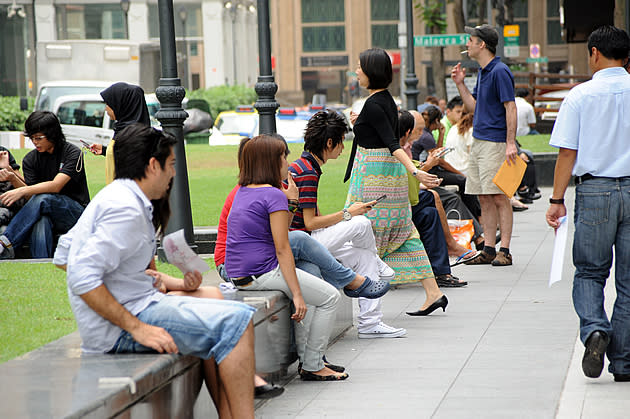What’s the real plan for foreign labour, the economy?

If you've been following the stampede of objections after one professor suggested "shock therapy" to up the wages of the lower income, you would have read that higher wages alone is considered a potentially "dangerous" thing.
It can cause all sorts of ill effects, which the prime minister himself laid out in no uncertain terms. "Business costs would go up, affecting Singapore's competitiveness, and inflation could rise," the Straits Times reported him as having said in his May Day message.
I pity the low-income earners. It seems that asking for a pay rise engenders much hand-wringing from the powers-that-be. The bottom strata of our society, who do not work less hard than anyone else, is required to raise productivity before talk of any wage increase is entertained. Preferably, they should raise it by 3 per cent every year for the next 10 years, as Deputy Prime Minister Tharman Shanmugaratnam had pledged to achieve.
Otherwise, the low income earners might cause businesses to go bust, do real damage to our competitiveness, and be responsible for spiralling inflation. Quite a mess and a catastrophe, isn't it?
One union leader even said that "[we] should work on productivity first and then the (higher) wages will come later ... because after giving wage increase, nobody will work harder."
Circular thinking
With the latest inflation numbers at a record high in some years (5.2 per cent), the debate on higher wages has taken on more urgency. Tharman, in trying to deflect criticisms, said the average Singaporean will not feel the "sharp effects" of inflation. Nonetheless, it seems our unions are now asking for more pay for workers "to beat inflation". It is a curious thing to now say, given what has been said the last few days about how higher salaries will lead to inflation. Talk about circular logic.
Nutshell: Although inflation is at record high, the average Singaporean will not feel it, but we need to up wages to keep pace with inflation, the same inflation which will be worsened by the same higher pay being asked for which will raise business costs and affect competitiveness which may cause one to lose one's job.
Whatever the rhetoric, it is a confusing message which is being sent out. The low-income continue to have their wages depressed, a fact which even the government has accepted and recognised.
The solution proposed seems to be raising productivity. From what the government has been saying, it almost seems that this is the panacea to all our ills visa-vis wages.
I am not too sure about this.
The low productivity could be due to the large number of foreign labour we have imbibed in the last 5 years. I don't think Singaporeans work any less hard or are less productive.
Also, with no meaningful and clear vision of where Singapore is going, and whether the government is going to reduce the 2 million foreigners here, all this talk about productivity is nothing but just that — talk.
I am no economist but even I know, I dare say, that harping on productivity as the magic pill to cure the ills of the economy or the wage problem is simplistic, unrealistic and even deceiving.
Broader discussion needed
I think Singaporeans want a bigger discussion about the issue. We do not want to hear about productivity without also knowing about the long-term plan for the economy, and changes, if any, to the immigration and foreign labour policy.
These two, more than anything else perhaps, have direct bearings on wages — now and into the future.
I do feel that the government should shed its holier-than-thou attitude, and come clean with Singaporeans. This is not so that we all can criticise the government, or to make even more demands.
Coming clean with its long term plans, strategies and vision will enable a deeper, more meaningful discussion on these issues which affect all of us, whether locals or non-locals.
So, please stop parading the bogeymen of inflation and low productivity, or of potential economic collapse. It is tiresome.
Lets talk seriously — about long term scenarios:
1. What are the government's plans for the amount of foreign labour in the next 10 to 20 years?
2. What is the government's long-term strategy for the overall economy?
As long as our lower-income, lower-skilled workers have to compete, in my view unnecessarily, with cheap foreign labour, no amount of productivity will raise their salaries in any significant measure.
I think we do not need a highly-skilled economist to tell us this.
In the end, the real "dangerous" thing for our country is Singaporeans not knowing where the government is taking this country — as can be seen by ministers saying one thing, the unions saying another, and Singaporeans being none the wiser.
Andrew helms publichouse.sg as Editor-in-Chief. His writings have been reproduced in other publications, including the Australian Housing Journal in 2010. He was nominated by Yahoo! Singapore as one of Singapore's most influential media persons in 2011.


